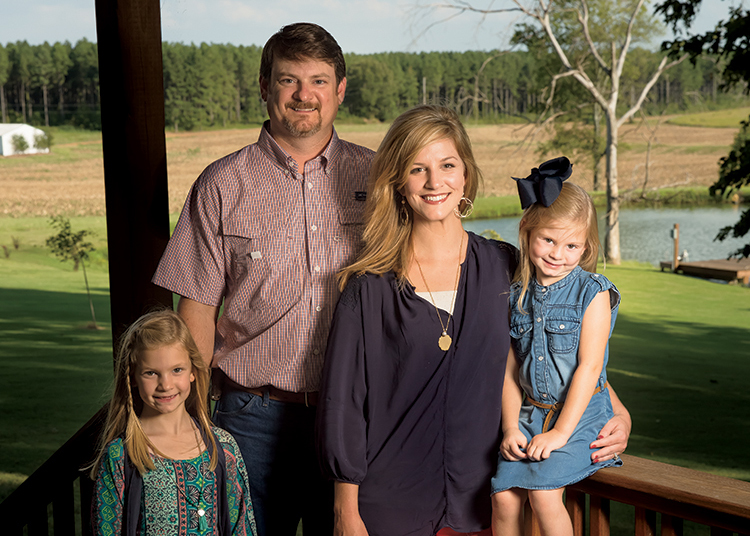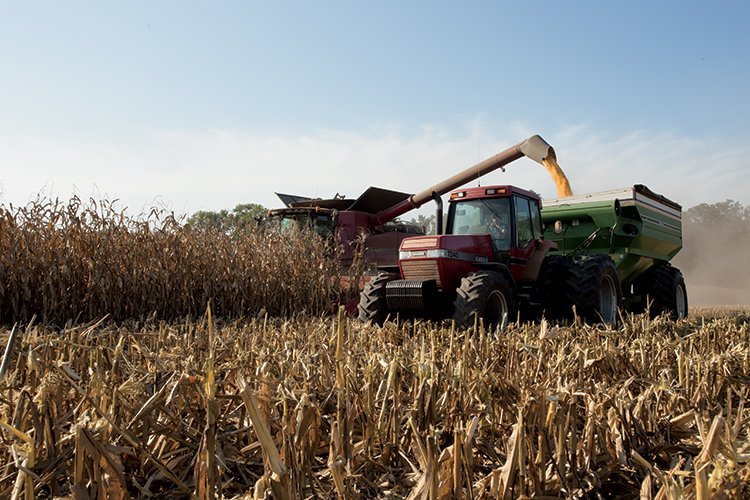Home > Tennessee > Tennessee Farm to Table > West Tennessee Family Farms Boost Economy
West Tennessee Family Farms Boost Economy
In partnership with: Tennessee Department of Agriculture

Agriculture has been the livelihood of farm families in Tennessee for generations. Out of the state’s nearly 70,000 farms, about 90 percent are family-owned. Approximately 5 percent of those are large-scale farms, which play a critical role in the sustainability of the industry and are significant contributors to the local economy. Large-scale farms are 2,000 acres or more in size and use various industrial methods to maximize production.
This is especially true for West Tennessee farms, where warmer temperatures, fertile soil and flat topography contribute to the success of profitable row crops.

Generations of Growth
Owned by fourth-generation farmer Eric Maupin, Dyer County’s Maupin Farms has operated on the same land for the last 80 years. Maupin farms 3,000 acres of wheat, corn and soybeans, along with a beef cattle operation.
“My great-grandfather started our farm in 1937. Thank the Lord, it’s gotten larger over the years. Every generation’s been able to add to it,” Maupin says. “I’m very proud that since my great-grandfather went from sharecropping to owning his own land, our family has been employing people.
“We have been a small business in our community for decades, and that’s something that we’re real proud of,” he says. “At the end of the day, our gross sales turn over in the local economy two and a half times. When agriculture’s doing well, especially in our rural communities, the entire community thrives.”
Maupin, who left a career in agriculture marketing to farm full time after his father retired, says the family farm has to grow in order to remain viable.
“In 1937, farmers could pretty much make a living off of 100 acres, but as the economy has changed, the profit margin per acre has gotten smaller, so we’re having to farm more and more acres to be able to make a living,” he says.
Arnold Stanfield, a third- generation farmer in McNairy County, agrees adding that equipment and production costs have also made profitability more difficult for smaller farms.
“You can afford your equipment a whole lot better with a large-scale farm. As a small farm, you can’t afford to buy a good piece of equipment. You just can’t do it,” says Stanfield, who, along with his two sons, farms corn, cotton and soybeans on 3,300 acres.
Maupin agrees. “When my dad started farming, you could buy a brand new combine for $5,000, and now a new combine will cost you $300,000. To be able to justify that, you need to farm more acres,” he says. “That also helps us spread our risk a little bit as we farm larger and larger. We’re spread out more, so something that happens in one particular area – say, we don’t get enough rainfall – hopefully it averages out if you’re covering a large enough land mass.”
 Using Technology Wisely
Using Technology Wisely
Stanfield, who harvested his 40th crop in 2016, says technology and innovations in cultivation practices have helped his family sustain their farm.
“We’ve gone from driving a tractor to the tractor driving itself. Precision farming has really changed,” he says. “We also work with the University of Tennessee- Martin Extension and put a lot of faith in them. We do some test plots ourselves on the farm.”
Maupin says he believes technological advances have had a great impact, allowing farms of all sizes to operate efficiently.
“With technology, we’re able to map our fields,” Maupin says. “Everything from calculating fertility to distribution of our seed is done by the grid. We’re trying to get the maximum yield that the farm can produce at the lowest cost. We’re doing a better job of studying our micronutrients within our farms; we’re doing a better job of keeping our fertility at the right level. We leave a smaller environmental imprint when we do that,” Maupin says.
“We’re doing everything more efficiently so that hopefully generations from now my family will still be farming that same ground that my great-grandfather bought, and that ground will actually be more productive and have better soil,” he says.



